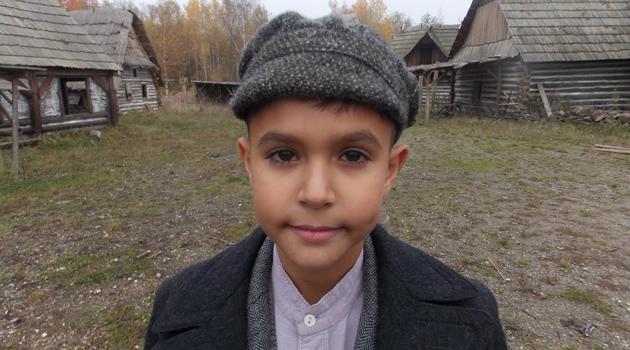Czech film of "The Painted Bird" features Romani child actor in the main role

Last Tuesday an audience of almost 2 000 watched the Czech premiere of “The Painted Bird“, Václav Marhoul‘s new film, in the biggest hall of the Congress Center in Prague. The film was released on 12 September in the Czech Republic.
The director, who opened the Prague screening, is planning a tour of cinemas throughout the country. The central character of the film is portrayed by a Romani boy, Petr Kotlár.
The film is awaiting screenings at more festivals abroad. “The Painted Bird is not a war film, and it is not even a film about the Holocaust,” the official press materials quote Marhoul as saying.
“I think it is an absolutely timeless, generally universal story, a story about the struggle between darkness and light, good and evil, genuine faith and organized religion, and many other such contrasts,” Marhoul said. The movie is based on the best-selling literary work of the same name by the Polish-American novelist Jerzy Kosiński.
Some audiences abroad have not been able to bear the cruelty and violence depicted by the film and have left midway through the screenings, while others, including many film critics abroad, have highlighted it exactly for its faithfulness to the book and its strong testimony. Kosiński claimed to have drawn from his own wartime experiences for the book.
Despite the fact that it is usually categorized as a post-Holocaust literary work, neither Nazis nor the systematic persecution of the Jewish nation play a significant role in the story. The novel is most concerned with the brutality, perversions and superstitions of both bourgeois and village society, as well as with the human capacity to commit the most unbelievable kinds of cruelty.
The novel is an essential text in terms of an artistic reaction to the events of the Holocaust and the Second World War. More than 100 million copies of the book have been sold worldwide.
The story, full of blood and cruelty, takes place in an unspecified Eastern European country during the Second World War. In addition to Czech, German, and Russian, an artificial inter-Slavic language is also spoken in the film.
The co-production features international stars, such as the Swedish actor Stellan Skarsgard as the German soldier Hans, Harvey Keitel in the role of the priest, and Julian Sands, adding yet another negative character to his filmography, Garbos, an alcohol distiller and pedophile. The main role of the boy undergoing a lifetime’s worth of trauma is played by Petr Kotlár.
Sufferings of a child actor
Originally the main role was meant to be performed by Petr’s brother, Michal Kotlár. By the time the director had raised the money for the film, however, Michal was too old for the role.
Petr was eight when filming began and his family experienced some rather difficult moments during production. Milan Kotlár, Petr’s grandfather and the owner of the Cikánská jizba (“Gypsy Room”) restaurant in Český Krumlov, told the Czech News Agency that Petr hadn’t wanted to get up in the mornings, made it home around midnight every day during the shooting, and wanted to quit at one point.
“He was furious, nervous, we were worried about him at home, Václav [Mohoul] was nervous about it, the entire crew, he was rude to them. He’s a child, he was eight, he wanted to play, even for an adult such days are annoying and long. Actors deal with it by drinking alcohol, for example, but what was this boy supposed to do? He has a ball, he can throw the Frisbee around, but that’s all. It was complicated to film with him, but I’m glad he made it to the end and that I didn’t arrange the wrong boy for [Mohoul],” the grandfather said.
The elder Kotlár is wishing his grandson and Marhoul the best when it comes to winning awards. “He made a good film. If this film brings something positive to Petr’s life, I can only be glad,” said the restaurant owner, who is also a town councilor in Český Krumlov for the Independents and TOP 09.
Shooting on the film ended last summer. It was preceded by eight years of preparation, including a two-year effort to acquire the film rights, 17 versions of the screenplay over three years, and more years of effort to finance the entire project.
After its premiere at the famous Venice International Film Festival earlier this month, “The Painted Bird” was given the Cinema for UNICEF award by a student jury for appealing to the need to uphold the rights of the child. While it did not win any of the main prizes, according to Czech experts, just being selected for the main competition of that prestigious display of world cinema is a great success for Czech cinematography.
